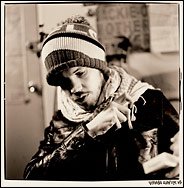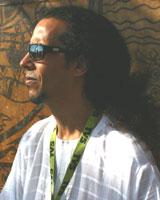It was announced Thursday that an AAUP-sponsored conference on academic boycotts, scheduled to be held in Bellagio, Italy, on February 13-17, would be "indefinitely postponed." According to
Haaretz, it was the successful pressure of US Jewish groups, including the ADL (Anti-Defamation League) and American Jewish Conference, that led to the "postponement."
Here's how Abraham Foxman, National Director of the ADL
justifies his organization's opposition:
"We were troubled to learn that eight of the 21 participants in this conference support the use of boycotts against the state of Israel...We support academic freedom, but one needs to proceed with caution when the views being included are far outside of the mainstream, or when the message involves anti-Semitism, Holocaust denial, or questions Israel's right to exist."
The eight pro-boycott academics in question are:
Omar Barghouti, Tel Aviv University
Yehudith Harel, Tel Aviv University
Rema Hammami, Birzeit University (Palestine)
Lisa Taraki, Birzeit University (Palestine)
Sondra Hale, University of California, Los Angeles
Shireen Hassim, University of Witwatersrand (South Africa)
Hilary Rose, City University (London)
Ur Schlonsky, University of Geneva
I know Rema Hammami, an anthropologist who did her Ph.D. at Temple University, and Lisa Taraki, a sociologist, and I've met Sondra Hale. At least three of the eight are Jewish, and two teach in Israel. It is typical of the defamation that ADL routinely circulates that the eight are smeared with accusations of anti-Semitism, Holocaust denial, and denial of Israel's right to exist. Not a shred of evidence is adduced, and I strongly doubt that any exists.
There was, however, a cock-up in the organization of the conference. According to the
AAUP,"due to an egregious error, we had included in the pre-conference packet a deeply offensive article by a Holocaust denier. The article had been collected during our research for the conference, but it was never intended for distribution to the participants or, indeed, to anyone else. We notified all the participants in the conference at once of this blunder and that the article had been pulled."
Haaretz claims that the article was passed out (it's not clear how or to whom); according to the
AAUP, the article was pulled and never intended for distribution.
The AAUP, having acknowledged its mistake, intended to proceed with the conference, but according to the
ADL statement, Ford, Rockefeller, and Nathan Brown did not agree. Apparently this is what caused the "postponement."
AAUP attempted to organize a conference to discuss the question of academic boycotts. AAUP is on record as being against such boycotts. The discussion at Bellagio in no way would have resulted in any change in its policy or any other group's policy regarding boycott, it would have simply been an airing of differences. The AAUP mistakenly put in an inappropriate article that had
nothing to do with its own positions or the political positions of the participants. The AAUP caught its own error and apologized. The ADL and like-minded Jewish groups apply pressure and--a predictable denouement.
The affair is entirely representative of the skittishness and lack of courage prevalent in the US academy, when it comes to even discussing applying pressure to Israel for its occupation policies in the West Bank and Gaza. (We will get to celebrate the 39th anniversary of the Occupation this June.)
The US Presbyterian Church, which voted in June 2004 to divest from companies doing business with or in Israel, is
so much more courageous than the US academy.
Tags:
boycott,
Israel

















